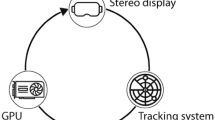
Overview
- This book is open access, which means that you have free and unlimited access
- An audio-first perspective to virtual reality for which plausible and convincing sounds are indispensable
- Reviews the key advances in auralization and spatial audio technologies
- Shares insights for the sonic interaction design of virtual reality experiences
Part of the book series: Human–Computer Interaction Series (HCIS)
Buy print copy
Tax calculation will be finalised at checkout
About this book
This open access book tackles the design of 3D spatial interactions in an audio-centered and audio-first perspective, providing the fundamental notions related to the creation and evaluation of immersive sonic experiences. The key elements that enhance the sensation of place in a virtual environment (VE) are:
Immersive audio: the computational aspects of the acoustical-space properties of Virutal Reality (VR) technologies
Sonic interaction: the human-computer interplay through auditory feedback in VE
VR systems: naturally support multimodal integration, impacting different application domains
Sonic Interactions in Virtual Environments will feature state-of-the-art research on real-time auralization, sonic interaction design in VR, quality of the experience in multimodal scenarios, and applications. Contributors and editors include interdisciplinary experts from the fields of computer science, engineering, acoustics, psychology, design, humanities, and beyond.
Their mission is to shape an emerging new field of study at the intersection of sonic interaction design and immersive media, embracing an archipelago of existing research spread in different audio communities and to increase among the VR communities, researchers, and practitioners, the awareness of the importance of sonic elements when designing immersive environments.
Similar content being viewed by others
Keywords
Table of contents (13 chapters)
-
Front Matter
-
Introduction
-
Front Matter
-
-
Sonic Interactions
-
Front Matter
-
-
Sonic Experiences
-
Front Matter
-
-
Back Matter
Editors and Affiliations
About the editors
Michele Geronazzo is an Associate Professor at the University of Padova (Italy) - Dept. of Management and Engineering. He received his M.S. degree in Computer Engineering (2009) and his Ph.D. degree in Information and Communication Technologies (2014) from the same University. He is currently part of the coordination unit of the EU-H2020 project SONICOM at Imperial College London (United Kingdom). Between 2014 and 2021, he has worked as an Assistant Professor at the University of Udine (Italy) and postdoctoral researcher at Imperial College London (United Kingdom), Aalborg University in Copenhagen (Denmark), and the University of Verona (Italy) in the fields of neurosciences and simulations of complex human-systems interactions. He is IEEE Senior Member and part of the organizing committee of the IEEE VR Workshop on Sonic Interactions for Virtual Environments since 2015 (chair of the 2018 and 2020 editions). From September 2019, Michele Geronazzo has been appointed as Editorial Board member for Frontiers in Virtual Reality. He is a co-recipient of six best paper/poster awards and co-author of more than seventy scientific publications. In 2015, his Ph.D. thesis was honored by the Acoustic Society of Italy (AIA) with the ”G. Sarcedote” award.
Stefania Serafin is Professor of Sonic interaction design at Aalborg University in Copenhagen and the leader of the Multi-sensory Experience Lab together with Rolf Nordahl. She was previously appointed Associate Professor (2006-2013) and Assistant Professor (2003-2006) in the same University. She has been visiting researcher at the University of Cambridge and KTH in Stockholm (2003) and visiting professor at the University of Virginia (2002). Since 2014 she is the President of the Sound and Music Computing association, and since 2018 Project Leader of the Nordic Sound and Music Computing network supported by Nordforsk. She has been part of the organizing committee of theIEEE VR Workshop on Sonic Interactions for Virtual Environments from the first edition. She is also the coordinator of the Sound and music computing Master at Aalborg University. Stefania received her PhD entitled “The sound of friction: computer models, playability and musical applications” from Stanford University in 2004, supervised by Professor Julius Smith III. She is co-author of more than 300 papers in the fields of sound and music computing, sound for virtual and augmented reality, sonic interaction design and new interfaces for musical expression.
Bibliographic Information
Book Title: Sonic Interactions in Virtual Environments
Editors: Michele Geronazzo, Stefania Serafin
Series Title: Human–Computer Interaction Series
DOI: https://doi.org/10.1007/978-3-031-04021-4
Publisher: Springer Cham
eBook Packages: Computer Science, Computer Science (R0)
Copyright Information: The Editor(s) (if applicable) and The Author(s) 2023
Hardcover ISBN: 978-3-031-04020-7Published: 14 October 2022
Softcover ISBN: 978-3-031-04023-8Published: 14 October 2022
eBook ISBN: 978-3-031-04021-4Published: 13 October 2022
Series ISSN: 1571-5035
Series E-ISSN: 2524-4477
Edition Number: 1
Number of Pages: XXII, 428
Number of Illustrations: 39 b/w illustrations, 79 illustrations in colour
Topics: User Interfaces and Human Computer Interaction, Computer Appl. in Arts and Humanities, Music, Media Design, Multimedia Information Systems



